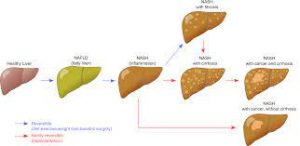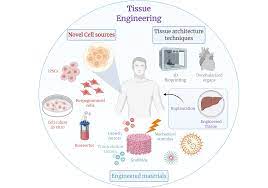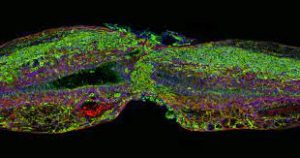Human Growth Hormone Rehabilitation Benefits

Human Growth Hormone May Improve Physical Therapy Outcomes in the Elderly
Human Growth Hormone Replacement Therapy has been shown to both increase Bone Mineral Density and Increase Lean Muscle in elderly patients. New evidence shows that HGH Hormone Replacement may offer another benefit: Increased healing capacity.
Dr. Robert Costa, professor of molecular genetics and biochemistry at the University of Illinois at Chicago, says that he and his staff have discovered that Human Growth Hormone can switch on a gene responsible for tissue regenerating and healing more quickly.
This function of HGH may help explain one critical factor of the aging process: The older we get, the more complicated it is to recover from injury or tissue damage.
Aging is the Result of Ongoing Physical Breakdown
It is believed that one of the ways that the body physiologically ages is through a slow process of degradation, resulting from the body's reduced ability to heal efficiently. HGH Levels appear to have a distinct correlation with the speed at which our bodies can heal. Dr. Costa explains that the gene Foxm1b plays a critical role in the human body's ability to undergo repair.
Foxm1b is turned on directly by Human Growth Hormone secretion. As the body releases less HGH, Foxm1b loses its ability to efficiently restore tissue to a healthy state after damage or injury.
HGH Study in Hepatology
The study in which Dr. Costa participated was released in the medical journal Hepatology. Although this study was conducted with animals, there is sufficient evidence to extrapolate the results of this animal research to human patients.
Dr. Costa's study revolved around liver regeneration in young and aging mice. The study compared two-month-old mice with twelve-month-old mice  regarding their capacity to recover from tissue damage in the liver.
regarding their capacity to recover from tissue damage in the liver.
The liver was chosen for this study because of a unique trait: It can completely restore itself simply from a collection of mature liver cells. No other organ in the human body can completely rebuild itself with such a sparse set of resources.
The Importance of Foxm1b
Foxm1b is an essential gene that plays a role in every aspect of the development of all mammalian cells. Foxm1b is active within all cells upon cell division throughout the development of the cell and until the cell finally surrenders to apoptosis at the end of its life cycle.
Early in life, the Foxm1b gene is highly active, but the gene becomes less and less responsive as mammals age.
Foxm1B Activation Heals Organs
In earlier research, scientists added the human form of Foxm1b into aging mice with livers that had been partially destroyed. Humans and mice have Foxm1b genes that are functionally identical and serve nearly the exact same set of purposes within the body.
Researchers found that adding the Foxm1b gene to damaged livers increased the speed at which the liver recovered from the damage. The rate at which recovery occurred was similar to that of younger mice.
Upon further analysis, the study also showed precisely how the Foxm1b regulates the health and function of cells throughout the lifespan, encouraging them to undergo the process of cellular division more efficiently and quickly.
The Correlation between HGH Exposure and Foxm1b Activation
This study aimed to test the effect of HGH on the rate at which cell division occurs in aging organisms.
The previous study already made it clear that activated Foxm1b can increase regenerative capacity, and researchers hypothesized that Human Growth Hormone might have the capability to activate dormant Foxm1b cells, thus encouraging increased healing capacity later in the aging process.
What is the Role of HGH?
Human Growth Hormone is one of the most important hormones which regulate health and function throughout the lifespan. Earlier in life, HGH is recognized primarily for its ability to spur growth and adolescent development. Still, later in life, the role of Growth Hormone is primarily to maintain optimal health balance and regulate cellular metabolism.
As the aging process continues, the body is less able to self-regulate and repair itself. This is believed to be at least partially the result of declining levels of Human Growth Hormone released by the Human Pituitary.
HGH Makes Cells Regenerate More Quickly
Dr. Costa says that there is evidence in the body of endocrinological research that HGH Hormone Replacement Therapy likely can increase rates of cellular regeneration in aging patients. This is one of the primary reasons why changes in physical composition occur due to HGH Injections.
Increased cellular metabolism leads to lean muscle mass, bone mineral density, and firmer skin because the body repairs and replaces dying cells quickly and more effectively.
Dr. Costa claims that the ultimate goal of his study is to discover how Human Growth Hormone functions at the molecular level to uncover new medical purposes for HGH Replacement Therapy.
Foxm1b HGH Study Results
The results of the study were pretty dramatic. When the year-old mice were administered HGH Injection, multiple tests showed that Foxm1b drastically increased activity. In addition, other proteins and enzymes responsible for cell division also became more active.
The mice experienced physiological regeneration at the organ level due to Human Growth Hormone Stimulation.
 The damaged livers repaired more quickly as a result of treatment, healing at a rate comparable to that of healthy, youthful mice. The cellular division's efficiency rate peaked after only 2 short days, and the liver was rehabilitated entirely after only a single week.
The damaged livers repaired more quickly as a result of treatment, healing at a rate comparable to that of healthy, youthful mice. The cellular division's efficiency rate peaked after only 2 short days, and the liver was rehabilitated entirely after only a single week.
As opposed to aging mice in the experimental group, control mice not administered HGH did not experience total regeneration until at least one month after the damage occurred.
This means that, in the case of mice, HGH Hormone Replacement can increase the rate at which liver rehabilitation takes place by over 400%. Of course, mice have metabolic processes much faster than our own (and thus, live shorter lifespans), but this study is proof of concept. Human Growth Hormone HRT can, and likely does, have the capacity to increase the rate of healing in aging patients.
In mice that did not receive supplemental HGH, the Foxm1b gene stayed relatively dormant, limiting the rate at which cellular regeneration could occur. Without the rapid increase in cell regeneration spurred by Human Growth Hormone, the liver could only repair itself at a slow and limited pace.
Foxm1B Deactivation Blunts the Effect of HGH
Further testing examined the function of HGH upon Foxm1b activation from the opposite perspective. The rodents were genetically altered in the second group of mice, so their livers contained Foxm1b genes that were inactivated.
In this second experiment, mice acted physiologically according to Dr. Costa's hypothesis. When the Foxm1b gene is inactivated, it prevents HGH injections from having appreciable effects on cellular metabolism and physiological recovery.
Dr. Costa explains that the results of the research conducted by his academic team show that Foxm1b is a necessary ingredient that is required to encourage the regeneration of the liver after damage occurs. There is also strong reason to believe that Human Growth Hormone Replacement Therapy can increase the physiological response rate in other tissues throughout the body.
Future Research will Improve our Knowledge of Foxm1b.
Although Dr. Costa finds the results of his study promising, he still urges caution regarding the use of Human Growth Hormone Replacement Therapy. He explains that his study only explores the short-term benefits of HGH Injection but does not offer any information regarding the long-term benefits or consequences of Human Growth Hormone Usage.
This study increases our knowledge of how Human Growth Hormone can benefit the body at a molecular level. Still, Dr. Costa encourages further research and evaluation before his data can be extrapolated fully to human patients.
Human Growth Hormone May Be Useful in Encouraging Physical Rehabilitation in Aging Patients
In the future, many are confident that HGH Injections can be utilized in elderly patients to increase physiological healing capacity and resiliency. There is hope that Human Growth Hormone can be used in urgent care situations to increase the speed of the healing process to preserve the health of the elderly patient more fully.
The Future of HGH Hormone Replacement Therapy
Perhaps in the future, a combination of therapies will become available to preserve health into old age. Since older patients tend to be more sensitive to Human Growth Hormone, it may be found that Sermorelin Acetate Injections can be a long-term solution to Age-Related HGH Deficiency, which minimizes the risk of overdose and side effects.
At the same time, Growth Hormone Injections can be utilized in rehabilitation to increase the healing process's effectiveness while stimulating cellular metabolism more directly.
Although Human Growth Hormone cannot be prescribed as an Anti-Aging Solution, in the future, as our knowledge of the benefits of the hormone become more complete, many restrictions on the use of the hormone will likely be lifted, and HGH can be utilized more fully as a tool of health optimization.
HGH May Be Beneficial in the Physical Rehabilitation Outcomes of Patients of All Ages
Although this study is primarily concerned with the concept of Human Growth Hormone as a tool to improve rehabilitation outcomes for older patients with low levels of innate Human Growth Hormone, some studies show that Human Growth Hormone has the potential to benefit adults of all ages that are going through the process of physical rehabilitation and therapy.
In the case of cartilage repair, for example, it appears that Human Growth Hormone and IGF-1 can restore healthy cartilage tissue, minimizing pain and limited range of movement, which is sometimes associated with cartilage surgery and damage.
limited range of movement, which is sometimes associated with cartilage surgery and damage.
In addition, HGH Hormone Injections may also benefit patients that have recently undergone surgery, whether they are suffering from HGH Deficiency or not. Side-effects of Human Growth Hormone use are primarily associated with long-term use at abusive levels.
Some hypothesize that patients of all ages can benefit from short-term therapy using Human Growth Hormone to spur tissue regeneration and shorten downtime from injury or surgery.
Time will only tell, but in future years, HGH will find increased acceptance as a medical treatment. Medical professionals will gradually uncover more significant benefits of HGH Hormone Replacement Therapy as a legitimate medical treatment.
- Research Hgh For Patients Over 60 [Last Updated On: September 8th, 2024] [Originally Added On: September 30th, 2020]
- Natural Hormone Replacement Abc News 13 [Last Updated On: December 21st, 2024] [Originally Added On: October 2nd, 2020]
- My Own Experience With Human Growth Hormone Case Study [Last Updated On: February 10th, 2025] [Originally Added On: October 3rd, 2020]
- Ipamorelin Alternative To Hgh Injection Therapy [Last Updated On: February 10th, 2025] [Originally Added On: October 4th, 2020]
- Human Growth Hormone Therapy For Adult Hgh Deficiency Do The Benefits Stack Up [Last Updated On: February 2nd, 2025] [Originally Added On: October 5th, 2020]
- HRT [Last Updated On: August 5th, 2024] [Originally Added On: October 7th, 2020]
- Hormone Replacement Therapy With Pellet Implants [Last Updated On: August 4th, 2024] [Originally Added On: October 8th, 2020]
- Omnitrope Bio-identical HGH Injections [Last Updated On: February 2nd, 2025] [Originally Added On: October 9th, 2020]
- Imported Human Growth Hormone Is Illegal In The United States [Last Updated On: February 1st, 2025] [Originally Added On: October 10th, 2020]
- Igf-1 Stimulates The Growth Of Motor Neurons In The Brain [Last Updated On: September 2nd, 2024] [Originally Added On: October 11th, 2020]
- Estrogen Hormone Replacement Therapy May Diminish Alzheimers Disease Risk [Last Updated On: February 1st, 2025] [Originally Added On: October 12th, 2020]
- The Potential Benefits Of Estrogen On Alzheimer's Risk [Last Updated On: January 31st, 2025] [Originally Added On: October 13th, 2020]
- Dr. Hotze Talks About A Natural Solution For Depression. [Last Updated On: December 23rd, 2024] [Originally Added On: October 14th, 2020]
- Anastrozole Research Study [Last Updated On: January 30th, 2025] [Originally Added On: October 15th, 2020]
- Symptoms Of Hormonal Imbalance In Women: What To Look For [Last Updated On: March 15th, 2025] [Originally Added On: May 12th, 2021]
- Beware of Fake Hormone Booster Pills – Sign Up for the Real Deal [Last Updated On: February 27th, 2025] [Originally Added On: December 21st, 2022]
- Chronic Fatigue versus Hormone Deficiency: How Can Patients and Doctors Tell the Difference? [Last Updated On: July 10th, 2024] [Originally Added On: January 18th, 2023]
- Ipamorelin: A Safer, Cost-Effective Alternative to HGH Therapy [Last Updated On: February 13th, 2025] [Originally Added On: February 13th, 2025]
- Treatment of Hormone Deficiencies [Last Updated On: February 15th, 2025] [Originally Added On: February 15th, 2025]
Word Count: 1711







